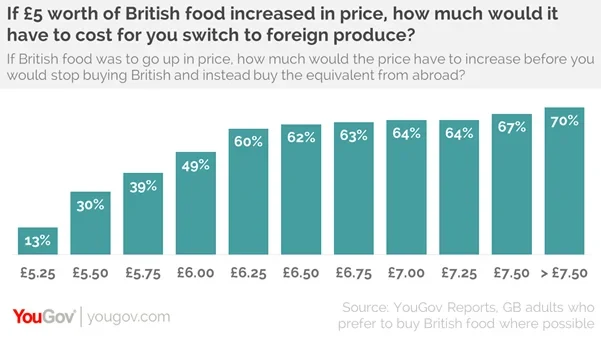One in five people say they are more likely to buy British food after Brexit because they want to support the domestic economy, but if prices rise many will look for cheaper foreign alternatives, new research from YouGov suggests.
The Buying British report shows that 23% of consumers are more likely to try and buy British food as a result of the UK’s decision to leave the European Union. Furthermore, one in seven (17%) are more likely to try to purchase British products as a result of last June’s referendum.
However, for a large number, cost wins out over country of origin. The report finds that if the cost of British food increased by 10%, three in ten people who look to buy it would choose foreign produce instead. If the price went up by 25%, six in ten (60%) would stop buying British and instead get the equivalent from abroad.

YouGov’s research finds that currently, over seven in ten (71%) try to purchase British food when they can and two thirds (66%) prefer to buy British products where possible. People’s main motivation in doing so is to support the UK economy. Almost three quarters (73%) buy British to support domestic farmers, and seven in ten (69%) do it to help British businesses.
The study shows that much of the allegiance to buying British comes from older consumers. While more than eight in ten (83%) people aged 55+ prefer to get British food where possible, the figure falls to over half among the under-35s (57% for 25-34 year-olds and 62% among 18-24 year-olds). It is a similar story when it comes to British products (79% of people aged 55+ versus 60% of 25-34 year-olds and 57% of 18-24 year-olds).
Since last June there has been much talk of boosting the economy of the UK by buying British. This research shows that this message is hitting home with a large number of consumers. However, with inflation increasing and household finances coming under pressure, for all the desire to buy British, many are willing to turn their back on domestically-produced food and products if prices rise.
Image iStock




